- Home
- Jude Deveraux
Sweetbriar
Sweetbriar Read online
Critical acclaim for the marvelous romances of
Jude Deveraux
TEMPTATION
“An exciting historical romance that centers on the early twentieth-century women’s rights movement…. Filled with excitement, action, and insight…. A nonstop thriller.”
—Harriet Klausner, Barnesandnoble.com
“A satisfying story.”
—Booklist
“Deveraux[’s] lively pace and happy endings…will keep readers turning pages.”
—Publishers Weekly
HIGH TIDE
A Romantic Times Top Pick
“High Tide is packed full of warmth, humor, sensual tension, and exciting adventure. What more could you ask of a book?”
—Romantic Times
“Fast-paced, suspenseful…. A sassy love story.”
—Publishers Weekly
Books by Jude Deveraux
The Velvet Promise
Highland Velvet
Velvet Song
Velvet Angel
Sweetbriar
Counterfeit Lady
Lost Lady
River Lady
Twin of Fire
Twin of Ice
The Temptress
The Raider
The Princess
The Awakening
The Maiden
The Taming
The Conquest
A Knight in Shining Armor
Wishes
Mountain Laurel
The Duchess
Eternity
Sweet Liar
The Invitation
Remembrance
The Heiress
Legend
An Angel for Emily
The Blessing
High Tide
Temptation
Published by POCKET BOOKS
This book is a work of fiction. Names, characters, places and incidents relating to non-historical figures are either the product of the author’s imagination or are used fictitiously. Any resemblance of such non-historical incidents, places or figures to actual events or locales or persons, living or dead, is entirely coincidental.
An Original Publication of POCKET BOOKS
POCKET BOOKS, a division of Simon & Schuster, Inc.
1230 Avenue of the Americas, New York, NY 10020
Copyright © 1983 by Deveraux Inc.
All rights reserved, including the right to reproduce this book or portions thereof in any form whatsoever. For information address Pocket Books, 1230 Avenue of the Americas, New York, NY 10020
ISBN-10: 0-743-45930-X
ISBN-13: 978-0-7434-5930-3
POCKET and colophon are registered trademarks of Simon & Schuster, Inc.
Visit us on the World Wide Web:
http://www.SimonSays.com
Chapter One
Kentucky Wilderness—October, 1784
THE FOREST CLOSED AROUND THE MOTLEY ARRAY of wagons, horses and people. Four wagons, in good repair, stood to one side, oxen grazing nearby, while two carriages, once pretty things, were barely standing on their high wheels. Tired women went about the chore of preparing supper while the men looked after the animals. A group of children was playing within sight of the adults.
“I can’t tell you how glad I am to be rid of some of this heat. It’s the sea I miss.” Mrs. Watson stood, putting a hand on the small of her back to ease her stomach and the child that would soon be born. “Where’s Linnet, Miranda?” she asked the woman across the fire from her.
“She’s playing with the children again.” The smaller woman’s voice had a clear, English accent, so different from her companion’s slurred words.
“Oh, I see her now.” Mrs. Watson shielded her eyes from the glare of the setting sun. “If a body didn’t know better, you wouldn’t be able to tell which was the children and which was Linnet.” She watched the girl, holding hands in a circle, no taller than the half-grown children for all her twenty years, a loose dress covering the young curves of her body, the same curves that had sent Mrs. Watson’s oldest boy to the Tyler wagon so many times. “You know, Miranda, you and Amos ought to talk to Linnet. It’s high time she had some young’uns of her own, ’stead of takin’ on everybody else’s.”
Miranda Tyler smiled. “You’re welcome to try, but Linnet has her own mind. Besides, to be honest, I’m not so sure young men are ready to take on the responsibility of my daughter.”
Mrs. Watson looked away and gave an embarrassed little laugh. “I’m afraid you’re right. Not that there’s anything wrong with Linnet, she’s certainly pretty enough, but it’s just the way she looks at a man, something about the way she stares at him and the way she always seems to be able to take care of herself. Mind if I sit a spell? My back hurts more every minute.”
“Certainly, Ellen. Amos set a stool out for me.”
The heavy woman sat, knees apart, as she tried to balance her huge stomach. “Now where was I?” She either didn’t see or pretended not to see Miranda’s frown. “Oh yes, I was talking about Linnet, the way she unnerves men. I did try to talk to her once, tried to explain how men like to feel they’re somethin’ special. Now look over yonder to Prudie James.”
Miranda did as she was told before returning her attention to the pot of beans.
“Now there isn’t a time of the day when Prudie isn’t surrounded by young men,” Ellen continued. “She’s not near as much to look at as your Linnet, but she always has the boys. Remember last week when Prudie was stung by a wasp? Four boys ran to help her.”
Miranda Tyler looked across the clearing to her daughter, her lips curving in a fond smile. She had her own memories, such as the time the little Parker boy had left the camp alone. Linnet had been the one who found him and had risked her own life to wedge herself under those loose rocks and bring the terrified boy to safety. Mrs. Watson could have all her Prudies she wanted.
“Of course, I’m not sayin’ anything against Linnet, she’s shore been a big help to me, it’s just that I…well, I want to see her happy, with a man of her own.”
“I’m grateful for your concern, Ellen, but I’m sure Linnet will find a husband someday and I’m sure he’ll be to her liking. Would you excuse me, please?”
The only warning they had was a dog’s yip, cut off in the middle, but even that wasn’t heard since the children were laughing in glee as they waited excitedly for the thimble to be secretly placed in their waiting hands.
The Indian raiders had long ago learned the benefit of surprise, attacking when the tired men and women were most relaxed, least vigilant. The men on guard had been easy to kill, their throats slashed in one clean, silent stroke. All that remained were the women, a few young adults, and the children. The children were what was of most interest to them, and two young braves were sent to tie and secure them.
Linnet, like the others, was paralyzed with shock. Her head turned sharply at a muffled cry, and she saw Prudie James fall to a heap on the ground. People began running then, trying hopelessly to escape the Indian men who seemed to be everywhere.
Linnet saw her mother take a step forward. Linnet put out her arms and began to run. If she could catch her mother, hold her, everything would be all right. “Mother!” she screamed.
Something hit her foot, and she slammed forward, the hard ground knocking the breath from her. Dazed, she tried to recover herself, feeling a moment of panic when her breath did not return right away. She blinked her eyes, seeing everything spin. As she turned her head, she tasted blood in her mouth from where her teeth had sunk into her lip when she’d fallen. Her mother lay quietly on the ground, near the fire, close to Mrs. Watson. They might have been napping, so ordinary did they seem, except the ground around them was a growing pool of a thick, red substance.
“Linnet! Linnet
!” Screams came from behind her as a hand roughly pulled her to her feet and pushed her toward the children. Little Ulysses Johnson ran to her, his arms wrapped about her legs, his tears wetting her skirt and his little body shaking horribly. He was pulled from her by one of the Indians. When the child fell, the man jerked the boy’s arm so that he cried out in pain.
“No!” Linnet ran to the boy, knelt before him and smoothed the dirt from his face. “I think they mean to take us with them. You’ll be brave, Uly? We’ll all be together, whatever happens. I don’t think they’ll hurt us if we obey them. Do you understand, Uly?”
“Yes,” came his jerky reply. “My Ma…”
“I know…” One of the Indians pushed her, pulling her hands behind her back, tying them tightly with the cutting, rawhide rope. She tried not to look at the carnage to her right, to the body of her mother, or to think of her father who had been on guard duty. She faced her eyes ahead to the six children in front of her.
It had been only minutes, yet their lives were forever changed. Patsy Gallagher fell, dragging Uly with her, and screamed when the Indian pulled her by her ties to her feet, the thin leather cutting her wrists. Ulysses began to cry again, and all the children stared at the fires the Indians had started and the bloody messes that had been their parents.
Linnet began to sing. Quietly at first, but with a slow, steady persistence that first one child and then another began to join: “Rock of Ages, cleft for me, Let me hide myself in Thee.”
They began walking, stumbling, falling often, as they marched slowly into the wilderness, tied together in a single, awkward line.
Linnet held Ulysses in her arms, the child’s limp body as much unconscious as asleep. They’d been traveling for three days with little rest and less food. The two younger children looked as if they couldn’t last much longer, and Linnet had persuaded one of the Indians, the leader, to allow her to carry the boy on her back. She moved her toes now, aware of the blisters, the many cuts. She was hungry, but she’d given half her cornmeal to Ulysses, and still he had whimpered for more. She stroked his forehead, aware that he was becoming feverish.
There were five Indians, sullen men, who demanded what they wanted and always got their demands. When Linnet had slowed her step because of the added weight of the heavy five-year-old on her back, they had prodded her with sharp sticks, forcing her to keep pace. Now she was too weary to sleep, her body hurting in too many places.
One of the Indians turned toward her and she hastily closed her eyes. Several times she had seen them pointing at her and talking, and she knew they discussed her.
It wasn’t light yet when the seven captives were pulled to their feet and made to begin another day’s journey. Near sunset, the Indians led them to a stream, waist deep, and pulled them into it.
“I’m scared, Linnet. I don’t like the water,” Uly said.
“I’ll carry him.” Linnet gestured to the man at the end of the line. He cut the connecting leather, and Ulysses climbed onto her back.
The other children were already on the far side when Linnet slipped and fell into the water. Instantly, one of the men cut the line that connected her to the others—they would not risk losing all their prisoners if one should chance to drown. Linnet had a difficult time pulling the hysterical, fighting Ulysses to shore, and when she did, she lay back on the ground panting from her exertions.
“Linnet! What are they saying?” Patsy Gallagher demanded.
Linnet looked up to see two of the men pointing at her and gesturing wildly. He called another man, the leader, and she saw the anger on this man’s face. Still dazed by her struggle in the water, she took a long time to realize that they pointed at her chest. The wet garment clung to her, emphasizing her full breasts. She crossed her hands to cover herself.
“Linnet!” Patsy screamed as one of the Indians advanced on her angrily.
She moved her arms quickly to cover her face from the first blow, but could not shield herself from the hard kicks to her ribs. She doubled in pain as more blows fell.
The Indians spewed angry words at her, and one hand turned her to her back, her bruised, maybe broken, ribs causing her to catch her breath sharply. The man tore her dress away to the waist, exposing her to him. What he saw seemed to make him even more angry. He doubled his fist, but Linnet never saw it land across her jaw.
“Linnet, wake up!”
She stirred slightly, wondering where she was.
“Linnet, they let me take care of you. Here, sit up and put this on. It’s Johnnie’s shirt.”
“Patsy?” she whispered.
“Oh, Linnet, you look awful! Your face is all swollen and…” The girl sniffed and pulled her friend to a sitting position as she shoved her arms into the coarse linsey-woolsey shirt. “Linnet, talk to me. Are you all right?”
“I think so. They let you come? I thought they would leave me. Why were they so angry?”
“Well, me and Johnnie figure they thought you was a kid and when they found out you wasn’t…”
“Oh, but why have they let you come to me?”
“I don’t know, but if it wasn’t for you, we all know we couldn’t have made it. Maybe the Indians know that, too. Oh, Linnet, I’m so scared.” The girl threw her arms around Linnet’s neck and she had to clench her teeth to keep her pain from showing.
“I’m scared, too,” Linnet whispered through her teeth.
“You! You’re never scared. Johnnie says you’re the bravest person in the world.”
She smiled at the girl, although it hurt her to do so. “I may look brave, but I’m all apple jelly inside.”
“Me, too.”
Patsy helped Linnet back to the Indians’ camp, the woman no larger than the twelve-year-old girl. All the children welcomed her with half-smiles, the first time they had even tried to overcome their terror.
Early the next morning, they reached the more permanent camp of the Indians. Women, dirty, ragged, ran to greet their men and run hands over the children. The Indian leader pushed Linnet toward a group of women, pointing and gesturing from his chest to hers.
One of the women yelled and tore the shirt open, striking her on the breasts. Linnet bent forward and covered herself with her arms, and the women laughed. She looked up to see the children being led away, their cries for help making her try to go to them, but the women stopped her, laughing, pinching her. One of them pulled her braids.
The Indian man spoke again, and the women took their hands from her, grumbling. One pushed her forward until Linnet realized she was to crawl into a crude grass-and-stick shelter. There wasn’t room to stand in the shelter, just room for two people to sleep. The woman followed her, holding a pottery bowl in her hands.
The contents of the bowl smelled horribly of rancid grease, and the Indian woman began to smear the paste all over Linnet’s face, and the upper part of her body, working it into her hair. She sat still, trying not to cry out or give way to her tears when the woman’s rough hands pressed on a particularly bruised area.
She was left alone then, alone to listen to the noises outside, the frantic yells of the men as they celebrated their successful raid.
“Here, drink this.” A strong arm supported Linnet and a metal cup was pressed to her lips. “Not so fast or you’ll choke.”
She blinked several times, not aware that she had fallen asleep. The man’s wide shoulders seemed to fill the little shelter. The flickering light from a fire outside caught the ivory gleam of a necklace tight around his throat, his body barely clad. He gently leaned back against a supporting pole and took her wrist, studying her hands before rubbing salve into the cuts.
“I can see why they thought you were a child,” he said in a deep low voice.
“You speak English,” Linnet said in her quiet accent.
He cocked one eyebrow at her. “Not the same sort as you, but I reckon it’ll pass for English.”
“I saw you. I thought you were an Indian, but you’re not. I think your eyes are blue,
aren’t they?”
He looked at her in surprise, wondering at her apparent calm.
“Where are the children? Why are we here? They…killed the others.”
He looked away from her for a moment, not wanting to see the grief in her eyes, yet amazed that she could even think of someone besides herself. “This is a group of renegades, a mixture of outcasts from several tribes. They capture children and sell them to other tribes to replace lost sons and daughters. They thought you were one of the children and weren’t too happy when they found you weren’t.” His eyes went involuntarily to her breasts. Crazy Bear had had a lot to say about her womanliness.
“What…what do they plan to do with us now?”
He watched her carefully, his blue eyes intense. “The children will be cared for, but you…”
Linnet swallowed and met his gaze. “I’d like to know the truth.”
“The men gamble now to see who gets you. After that…”
“Gets me? I am to marry one of these men?”
His voice was very soft. “No, they don’t intend marriage.”
“Oh.” Linnet’s lower lip trembled and she caught it between her teeth to still the motion. “Why are you here?”
“My grandmother was a Shawnee and one of these men is my cousin. They tolerate me, but that’s about all. I’ve been in the north, trapping.”
“I don’t guess there’s anything you can do to help us?”
“No, I’m afraid not. I must go now. More water?”
She shook her head. “Thank you, Mr.…?”
“Mac.” He wanted to get away. She was so young and it was obvious she had been beaten.
“Thank you, Mr. Mac.”
“No, just Mac.”
“Mac? Is that your surname or your Christian name?”
He gaped at her in bewilderment. “What?”
“Is Mac your last name or your first name?”
He was astonished. “You are the beatinest woman. What the hell difference does it make?”
She blinked at him, looking as if his harsh words might make her cry, even when all the blows had failed.

 Eternity
Eternity The Temptress
The Temptress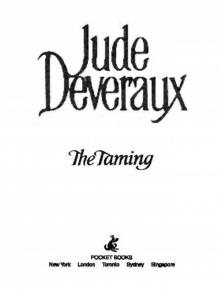 The Taming
The Taming True Love
True Love Forever...
Forever... Lavender Morning
Lavender Morning The Velvet Promise
The Velvet Promise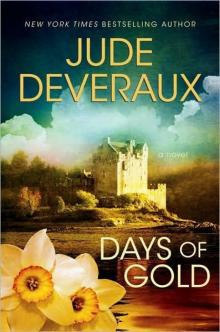 Days of Gold
Days of Gold Temptation
Temptation Counterfeit Lady
Counterfeit Lady Twin of Fire
Twin of Fire Remembrance
Remembrance Velvet Angel
Velvet Angel The Enchanted Land
The Enchanted Land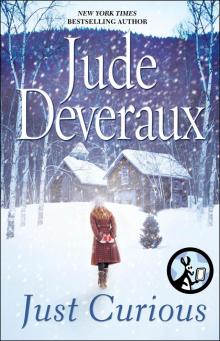 Just Curious
Just Curious Wild Orchids
Wild Orchids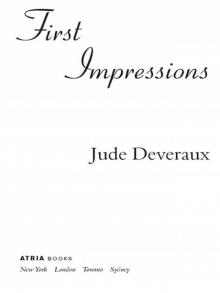 First Impressions
First Impressions Wishes
Wishes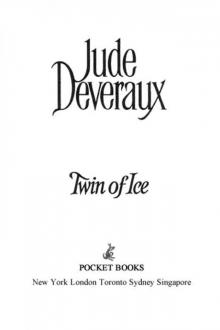 Twin of Ice
Twin of Ice Ever After
Ever After An Angel for Emily
An Angel for Emily River Lady
River Lady The Invitation
The Invitation Scarlet Nights
Scarlet Nights The Black Lyon
The Black Lyon High Tide
High Tide The Girl From Summer Hill
The Girl From Summer Hill Sweetbriar
Sweetbriar As You Wish
As You Wish For All Time
For All Time Secrets
Secrets The Blessing
The Blessing Upon a Midnight Clear
Upon a Midnight Clear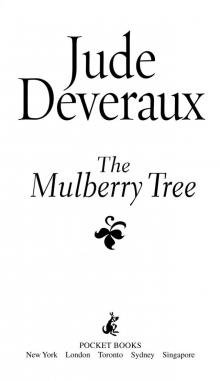 The Mulberry Tree
The Mulberry Tree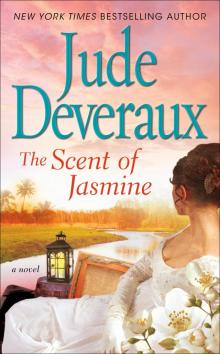 The Scent of Jasmine
The Scent of Jasmine Sweet Liar
Sweet Liar Carolina Isle
Carolina Isle Holly
Holly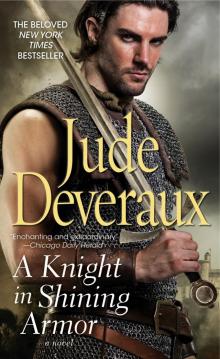 A Knight in Shining Armor
A Knight in Shining Armor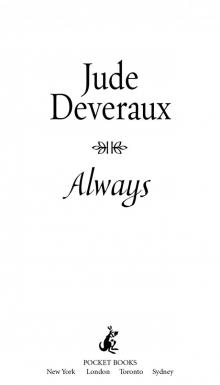 Always
Always The Duchess
The Duchess Forever and Always
Forever and Always The Raider
The Raider The Conquest
The Conquest Moonlight in the Morning
Moonlight in the Morning The Heiress
The Heiress Stranger in the Moonlight
Stranger in the Moonlight Moonlight Masquerade
Moonlight Masquerade Change of Heart
Change of Heart The Awakening
The Awakening Velvet Song
Velvet Song Someone to Love
Someone to Love The Summerhouse
The Summerhouse The Princess
The Princess Highland Velvet
Highland Velvet A Forgotten Murder
A Forgotten Murder Lost Lady
Lost Lady Met Her Match
Met Her Match LEGEND
LEGEND Forever: A Novel of Good and Evil, Love and Hope
Forever: A Novel of Good and Evil, Love and Hope Scarlet Nights: An Edilean Novel
Scarlet Nights: An Edilean Novel